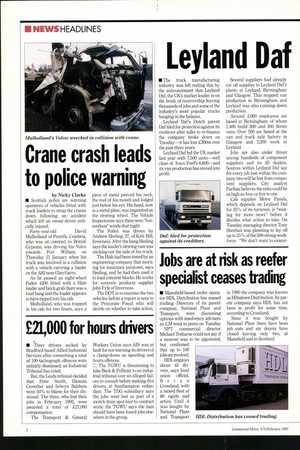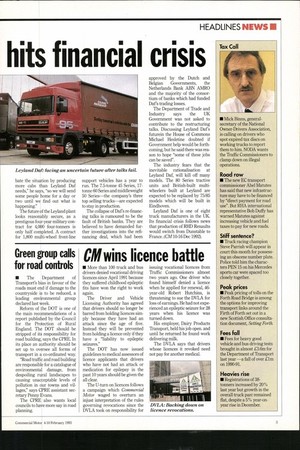Leyland Daf hits financia crisis • The truck manufacturing industry
Page 4

Page 5

If you've noticed an error in this article please click here to report it so we can fix it.
was left reeling this by the announcement that Leyland Daf, the UK's market leader, is on the brink of receivership leaving thousands of jobs and some of the industry's most popular trucks hanging in the balance.
Leyland Daf's Dutch parent Daf filed for protection against its creditors after talks to re-finance the company broke down on Tuesday—it has lost £300m over the past three years.
Leyland Daf led the UK market last year with 7,500 units—well clear of Iveco Ford's 6,600—and its van production has moved into profit. Several suppliers had already cut off supplies to Leyland Daf's plants at Leyland, Birmingham and Glasgow. This stopped van production in Birmingham and Leyland was also running down production.
Around 2,000 employees are based at Birmingham, of whom 1,400 build 200 and 400 Series vans. Over 500 are based at the van and truck axle factory in Glasgow and 2,200 work at Leyland.
Jobs are also under threat among hundreds of component suppliers and its 65 dealers. Sources within Leyland Daf say for every job lost within the company two will be lost from component suppliers. City analyst Paribas believes the ratio could be as high as four or five to one.
Cab supplier Motor Panels, which depends on Leyland Daf for 25% of its turnover, is "waiting for more news" before it decides what action to take. On Tuesday managing director Tony Sheehan was planning to lay off up to 25% of the 500-strong workforce. "We don't want to exacer bate the situation by producing more cabs than Leyland Daf needs," he says, "so we will send some people home for a day or two until we find out what is happening."
The future of the Leyland plant looks reasonably secure, as a prestigous four-year military contract for 4,000 four-tonners is only half completed. A contract for 1,800 multi-wheel front-line support vehicles has a year to run. The 7.5-tonne 45 Series, 17tonne 60 Series and middleweight 50 Series—the company's three top selling trucks—are expected to stay in production.
The collapse of Daf's re-financing talks is rumoured to be the fault of British banks. They are believed to have demanded further investigations into the refinancing deal, which had been approved by the Dutch and Belgian Governments, the Netherlands Bank ABN AMRO and the majority of the consortium of banks which had funded Daf's trading losses.
The Department of Trade and Industry says the UK Government was not asked to contribute to the restructuring talks. Discussing Leyland Daf's futurein the House of Commons Michael Hesletine doubted if Government help would be forthcoming, but he said there was reason to hope "some of these jobs can be saved".
The industry fears that the inevitable rationalisation at Leyland Daf, will kill off many models. The 80 Series tractive units and British-built multiwheelers built at Leyland are expected to be replaced by 75/85 models which will be built in Eindhoven.
Leyland Daf is one of eight truck manufacturers in the UK. Its financial crisis follows news that production of RHD Renaults would switch from Dunstable to France. (CM 10-16 Dec 1992).
















































































